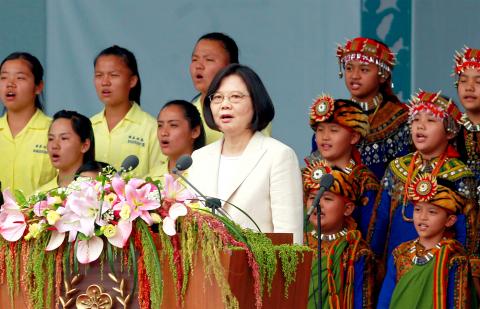China has rescinded an invitation to the Puzangalan Children’s Choir, in an apparent retaliation to its performance of the Republic of China (ROC) national anthem at President Tsai Ing-wen’s (蔡英文) inaugural ceremony, sources said yesterday.
The Paiwan children’s choir from Pingtung County’s Majia Township (瑪家), gained media attention when it sang the national anthem in traditional Paiwan vocals at Tsai’s inauguration.
The choir’s executive officer Tsai Yi-fang (蔡義芳) said the group was scheduled to tour China next month and Hungary in August.

Photo: AP
China’s withdrawal of its invitation has compromised the group’s plans to tour Hungary, because Beijing canceled payments for the children’s airfares, resulting in an additional NT$1.3 million (US$40,072) in travel and related expenses, he said.
Tsai Yi-fang said the group was already short by NT$70,000 prior to the cancelation, which was announced without notice, adding that the group is looking for ways to raise the funds.
Documentary director Chou Shih-lun (周世倫), who is also raising funds to make a film about the group, said that although several businesses have expressed interest in buying costumes and equipment for the group, it has not found a sponsor for its travel expenses.
“We thought the fame brought by the choir’s national anthem performance would help with funding, but instead of finding us new sponsors, it made the Chinese aware of us,” Tsai Yi-fang said.
He said the choir will continue rehearsing for planned performances in Hungary, in spite of not having the travel funds, adding: “I am doing everything in my power to keep the children singing.”
The Presidential Office last night said that President Tsai Ing-wen (蔡英文) was concerned about the issue, and would donate NT$500,000 to the choir from the royalties of a book published in October last year.
Tsai hopes other donors follow suit, the office added.

MORE VISITORS: The Tourism Administration said that it is seeing positive prospects in its efforts to expand the tourism market in North America and Europe Taiwan has been ranked as the cheapest place in the world to travel to this year, based on a list recommended by NerdWallet. The San Francisco-based personal finance company said that Taiwan topped the list of 16 nations it chose for budget travelers because US tourists do not need visas and travelers can easily have a good meal for less than US$10. A bus ride in Taipei costs just under US$0.50, while subway rides start at US$0.60, the firm said, adding that public transportation in Taiwan is easy to navigate. The firm also called Taiwan a “food lover’s paradise,” citing inexpensive breakfast stalls

TRADE: A mandatory declaration of origin for manufactured goods bound for the US is to take effect on May 7 to block China from exploiting Taiwan’s trade channels All products manufactured in Taiwan and exported to the US must include a signed declaration of origin starting on May 7, the Bureau of Foreign Trade announced yesterday. US President Donald Trump on April 2 imposed a 32 percent tariff on imports from Taiwan, but one week later announced a 90-day pause on its implementation. However, a universal 10 percent tariff was immediately applied to most imports from around the world. On April 12, the Trump administration further exempted computers, smartphones and semiconductors from the new tariffs. In response, President William Lai’s (賴清德) administration has introduced a series of countermeasures to support affected

CROSS-STRAIT: The vast majority of Taiwanese support maintaining the ‘status quo,’ while concern is rising about Beijing’s influence operations More than eight out of 10 Taiwanese reject Beijing’s “one country, two systems” framework for cross-strait relations, according to a survey released by the Mainland Affairs Council (MAC) on Thursday. The MAC’s latest quarterly survey found that 84.4 percent of respondents opposed Beijing’s “one country, two systems” formula for handling cross-strait relations — a figure consistent with past polling. Over the past three years, opposition to the framework has remained high, ranging from a low of 83.6 percent in April 2023 to a peak of 89.6 percent in April last year. In the most recent poll, 82.5 percent also rejected China’s

PLUGGING HOLES: The amendments would bring the legislation in line with systems found in other countries such as Japan and the US, Legislator Chen Kuan-ting said Democratic Progressive Party (DPP) Legislator Chen Kuan-ting (陳冠廷) has proposed amending national security legislation amid a spate of espionage cases. Potential gaps in security vetting procedures for personnel with access to sensitive information prompted him to propose the amendments, which would introduce changes to Article 14 of the Classified National Security Information Protection Act (國家機密保護法), Chen said yesterday. The proposal, which aims to enhance interagency vetting procedures and reduce the risk of classified information leaks, would establish a comprehensive security clearance system in Taiwan, he said. The amendment would require character and loyalty checks for civil servants and intelligence personnel prior to